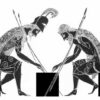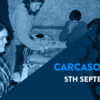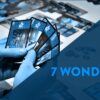Since 1997, the Creative Thinking World Championship has been run by the Mind Sports Olympiad. The competition consists of 4 rounds. Each round has a duration of 30 minutes during which contestants must use their imagination and creativity to answer one question by writing and/or drawing responses on paper. After each round, the responses are scored on a scale of 1 to 25 based on originality and depth (there’s no such thing as the ‘right’ answer–just the most creative). The fourth round often features diagrams from patent entries with a prompt asking contestants to create a story/explanation as to what device the patent describes (the highest marks are not necessarily given to the person who guesses what the device is really for–but rather for the most imaginative response).
William Hartston writes the questions and scores each round. Hartston draws upon an immense and eclectic range of interests. He won the British Chess Championship in 1973 and 1975. He writes the off-beat Beachcomber column for the Daily Express and has authored books on chess, mathematics, humour and trivia. He has also been a regular guest on the BBC Radio 4 and occasional TV programme, Puzzle Panel. Aside from his chess and media-related activities, Hartston is a Cambridge-educated mathematician and industrial psychologist. During the 1980s, he was recruited by Meredith Belbin, at the Industrial Training Research Unit in Cambridge, to work as part of a multi-disciplinary team researching the dynamics of team roles. While continuing to write the Beachcomber column and other features for the Daily Express, he has also been behind the launching of the wakkipedia.com Internet site of useless information. His latest publication is The Things That Nobody Knows (Atlantic Books), a discussion of 501 unanswered questions ranging from science to history, including a good supply of typically quirky items.
Examples of past questions:
One 2012 question alluded to prince Harry’s photos from Vegas:
You are an unmarried, high-profile 27-year-old visiting the USA and pictures have appeared on the Internet and in various publications around the world of you in a state of nakedness. In one of the pictures, you are being clasped from behind by a naked young lady; in another, you are being clasped similarly but face to face. Your charming 86-year-old granny is reported to be highly disturbed by the pictures. Your task is to explain what is happening in the pictures, what led up to it and what happened next in a way that will put your poor granny’s mind to rest.
MSO 2010 Round 2:
Many thousands of years hence, when almost all traces of present civilization have been lost, anthropologists discover an ancient artefact consisting of a set of button-like objects on which the following symbols may be discerned: !ӣ$%^&*()_+
Some smudges below these symbols suggest that each of these may have had a further symbol inscribed beneath it–though that theory is disputed. What does the anthropologist of the future make of this discovery, and what conclusions does he draw about our society?
MSO 2010 Round 3:
Over the past few millennia, the alphabet has evolved from ancient Phoenician, Sumerian and Babylonian glyphs via the Greeks and Romans to the mess we have today, with nobody even having a convincing theory to explain the conventional A, B, C, D, etc order we have inherited. The government has therefore decided at last to put some order into the alphabetical order and you have been commissioned to produce as report on considerations, systems and recommendations that will lead to the desired result of a logical and sensible ordering of the letters in the alphabet.
MSO 2012 Round 2:
What can you do with an Olympic silver medal that you cannot do with an Olympic gold medal, and vice versa: what can you do with an Olympic gold medal that you cannot do with an Olympic silver medal?




